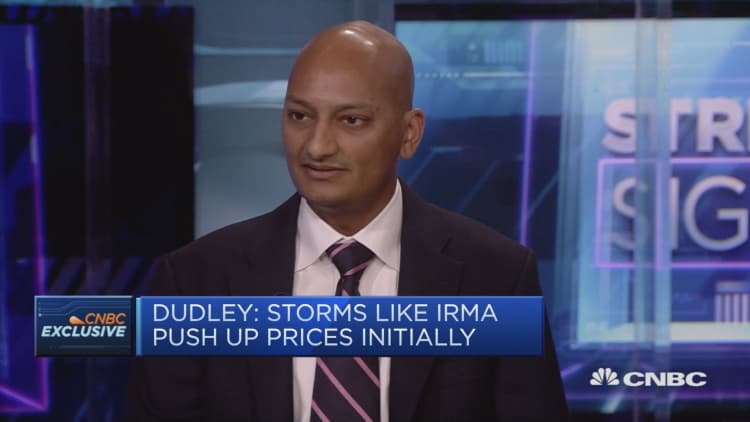Oil prices were mixed on Monday, with Hurricane Irma's pounding of Florida raising demand fears, while U.S. refinery restarts and Saudi cut extension talks gave upward pressure.
Benchmark U.S. West Texas Intermediate crude ended Monday's session up 59 cents, or 1.2 percent, to $48.07. Brent crude oil futures for November delivery were down 3 cents at $53.75 a barrel.
Hurricane Irma knocked out power to more than 6 million Florida homes and businesses after millions were told to evacuate ahead of the storm. Irma hit Florida on Sunday morning as a dangerous Category 4 hurricane. It gradually lost strength and weakened to a tropical storm by Monday morning as it headed towards Georgia.
Irma came on the heels of Hurricane Harvey, which struck the U.S. oil hub of Texas two weeks ago, knocking out a quarter of the nation's refineries, many of which are now restarting operations.
Now many refineries are restarting, including the largest U.S. refinery. On Monday, Motiva Enterprises restored the 325,000 barrel per day (bpd) VPS-5 crude distillation unit at its Port Arthur, Texas, refinery to minimum production levels sources said.

But the oversupply of U.S. crude persists, causing a further widening in the WTI/Brent spread, said James Williams, president of energy consultant WTRG Economics.
"Were waiting for our refineries to all get going," he said, "On the east coast we dont have enough gasoline so we have to import more product from Europe, which adds a boost to Brent."
The Brent/WTI spread has widened 63 cents or 11 percent by 12:24 p.m. ET.
The two hurricanes are expected to inflict a "bearish shock" on oil balances in September, denting global demand by 900,000 bpd and supply by about 300,000 bpd, Goldman said.
The longer-term focus, however, was on discussions over a possible extension to the 15-month production pact between members of the Organization of the Petroleum Exporting Countries (OPEC)and non-OPEC producers including Russia and Kazakhstan.
The deal aims to curb an oil supply glut that has weighed on crude prices for more than three years.

The deal agreed late last year to reduce output by about 1.8 million bpd until March 2018 helped to keep prices as high as $58 a barrel in January, but they have since sagged as global stocks have not fallen as quickly as expected.
Saudi Arabia's Energy Minister Khalid al-Falih met his Venezuelan and Kazakh counterparts at the weekend to discuss an extension of the deal by at least three months, the Saudi energy ministry said.
On Monday, Falih and his United Arab Emirates counterpart also agreed to consider an extension beyond March 2018.
Venezuela Energy Minister Eulogio del Pino said on Friday that global oil inventories remain too high and urged producers to look at exemptions granted to countries such as Libya and Nigeria and their effect on the market.
China has begun studying when to ban the production and sale of cars using traditional fuels, the official Xinhua news agency reported, citing comments by the vice industry minister, who predicted "turbulent times" for automakers forced to adapt.
— CNBC's Tom DiChristopher contributed to this report.

